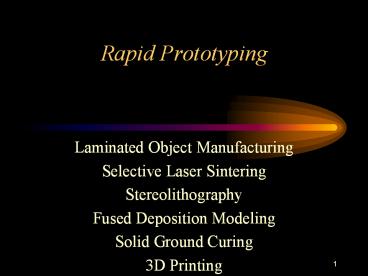Rapid Prototyping - PowerPoint PPT Presentation
Title:
Rapid Prototyping
Description:
Rapid Prototyping Laminated Object Manufacturing Selective Laser Sintering Stereolithography Fused Deposition Modeling Solid Ground Curing 3D Printing – PowerPoint PPT presentation
Number of Views:293
Avg rating:3.0/5.0
Title: Rapid Prototyping
1
Rapid Prototyping
- Laminated Object Manufacturing
- Selective Laser Sintering
- Stereolithography
- Fused Deposition Modeling
- Solid Ground Curing
- 3D Printing
2
What is Rapid Prototyping
- Builds parts Layer-By-Layer
- Class of technologies that construct physical
models from CAD data - Some what like a 3-D printer
- An Additive process
- Visual Aids or Design Testing
- Rapid Tooling or Rapid Production of parts
3
The Basic Process
- Create a CAD model of the design
- Convert the CAD model to STL format
- Slice the STL file into thin cross-sectional
layers - Construct the model one layer atop another
- Clean and finish the model
4
CAD MODEL
- Build a Model
- Solid Modeler Packages
- Such as Pro-Engineer tend to represent objects
more accurate then wire frame packages - Yield better results
- Existing CAD or Create a model for RP
5
Conversion to STL
- STL Format
- Establish consistency
- .stl stereolithography, the first RP
technique - Represents a 3-D surface in an assembly of planar
triangle - Like facets of a cut jewel
- Planar elements
- Can not represent curve surfaces exactly
- Accuracy vs. manageability
6
Conversion to STL
7
The Slice
- Pre-processing program
- Prepares STL file for build
- Most program allows user to adjust the model
- Size
- Location
- Orientation
8
The Slice
- Orientation
- Weaker and less accurate in the Z direction then
in the x-y plane - Orientation partially determines the amount of
time for build - Higher in the Z lot more time to build
- Place shortest dimension in the Z
- Reduces the number of layers
- Layers are slices from .01mm to .7 mm (technique)
9
The Slice
- Auxiliary Structure
- Supports the model during build
- Useful for delicate parts
- Some time difficult to remove
- Damage to Model
- Poor surface finish
10
Layer by Layer
- Construction of the part
- Several Techniques
- Builds part one layer at a time
- Polymers
- Paper
- Wax
- Powdered Metal
11
Clean and Finish
- Final Step is post-processing
- Removing prototype
- Detaching supports
- Curing (if needed)
- Minor Cleaning
- Surface treatment
- Sanding, sealing, painting and so on
12
Clean and Finish
13
Rapid Prototyping Techniques
14
Laminated Object Manufacturing
- Called LOM. (Helisys)
- Paper is coated heat-activated glue so it will
stick. (spool) - Paper is bonded with last piece with heated
rollers. - Design is cut out of paper with a laser.
- The excess paper is cross hatched for removal.
- Produces large parts.
- Wood like texture
15
LOM Process
16
LOM Examples
17
Selective Laser Sintering
- Called SLS. (DTM Carl Deckard)
- Melts powdered material a layer at a time.
- Uses leveling rollers
- Laser is used to melt powdered material.
- Traces part and sintering metal powder
- Makes functional parts.
- Many different powders can be used.
18
SLS Process
19
SLS Examples
20
Stereolithography
- Called SLA. (3D Systems first 1986)
- Photosensitive liquid resin hardens when exposed
to a laser. - Low-power high focused UV laser
- Traces out layer, solidifying resin
- Liquid epoxy or acrylate resin
- The part is created layer by layer.
- The part needs to be cured after it is created.
- Great accuracy and surface finish.
21
SLA Process
22
SLA Examples
23
SLA Examples Cont
24
Fused Deposition Modeling
- Second Most Widely Used
- Filament of heated thermoplastic is extruded from
the tip - X-Y plane
- Like decorating a cake
- Platform lowered and head deposits a second layer
upon the first - ABS, PC, Casting Wax, Polyphenolsulfone
25
FDM SAMPLES
26
Solid Ground Curing
- SGC - (Cubical)
- Similar to stereolithography
- Uses UV light
- Selectively hardens photosensitive polymers
- Cures entire process at a time
- Photomask
- Printed on glass plate
- UV light passes through the mask to the polymer
27
SGC
28
3D Jet Printing
- Entire class of machines
- 3D Printing (3DP MIT, Soligen Corp.)
- Powder (excess is blown off)
- ZCORP 3D (Z corp.)
- Powder (excess is blown off)
- Thermo-Jet (3D systems)
- Molten wax or polymer (no excess)
- The model is built up layer upon layer at a time.
- Ink-jet printer head technology
- Different materials can be used.
- Versatile
29
3D Printing Process
30
3D Printing Examples
31
3D Printing Examples Cont
32
3D Printing Examples Cont
33
Source Credit
- http//home.att.net/castleisland/lom_int.htm
- http//www.milparts.net/lom.html
- http//www.ind.tno.nl/prototyping/rapid_prototypin
g/lom.html - http//www.bath.ac.uk/en7bnd/rp/lom.htm
- http//home.att.net/castleisland/sls_int.htm
- http//www.materialise.com/mt.asp?mpps_laser
- http//www.cs.hut.fi/ado/rp/subsection3_6_3.html
34
Source Credit Cont.
- http//www.cs.hut.fi/ado/rp/subsection3_6_1.html
- http//www.padtinc.com/rm/sla/default.htm
- http//www.webworqs.com/nomura/stereo.html
- http//www.howstuffworks.com/stereolith3.htm
- http//www.nsf.gov/od/lpa/news/02/3dprinttip_image
s.htm - http//web.mit.edu/tdp/www/whatis3dp.html
- http//web.mit.edu/tdp/www/applications.html
- http//www.zcorp.com/content/product_info/keyadvan
tages.html































